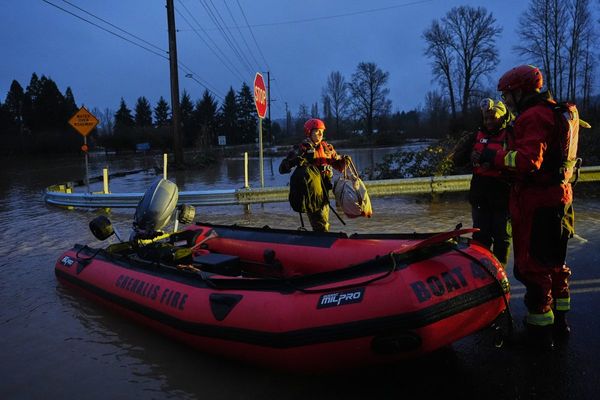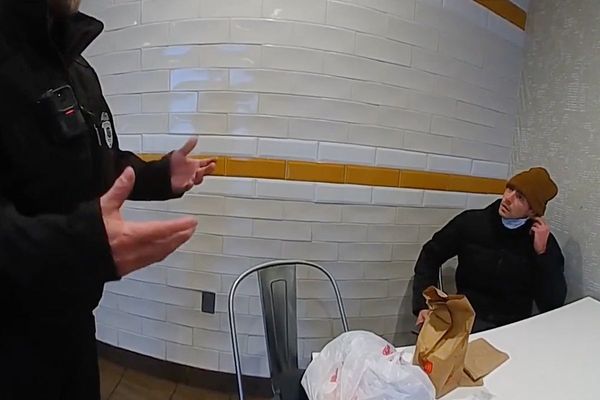
Well. What is it that I have just watched?
It’s not rare that I ask myself this question. It’s rare that it’s not rhetorical and even rarer that I ask it, desperately casting about for answers, after watching all six episodes of a series, with mounting incredulity yet growing addiction to the wildness proliferating on my screen. The multiple convolutions of the plot keep coming right until the last minute, yet they promise to be resolved – and they deliver.
All of this is a way of saying stick with Wolf. Even if by the end of the first episode you are fighting boredom; even if by the end of the second you feel as if you must have missed a vital memo or passed out at some point.
Adapted by Megan Gallagher from the late Mo Hayder’s 2014 novel of the same name, Wolf is essentially two stories told in contrasting styles, smashed together in the manner of a mad scientist transplanting an ape’s mind into a human body and stepping back to see what happens. There is possibly a ghostly third story, too – the unrealised form of whatever the heavyweight actors Juliet Stevenson and Owen Teale thought they were signing up to, because I bet it wasn’t this. They need have no regrets, but it’s a close run thing.

The first hare off and running is DI Jack Caffery (Ukweli Roach). He has recently moved back to London after a stint in south Wales, in order to return to surveilling his parents’ neighbour Ivan Penderecki (Anthony Webster), whom he believes was responsible for the abduction and presumed murder of Jack’s brother, Ewan, 30 years ago. Ewan’s body was never found and Ivan has been leaving children’s toys on Jack’s doorstep ever since, so it’s very much an unhelpful relationship for our Jack.
The second, but dominating, hare is the Donkey Pitch murders in Monmouthshire, five years ago. No, I don’t know what a donkey pitch is. No, it is not explained at any of the approximately 3bn times the phrase is uttered over the six-hour series. Yes, it does jar every time. Yet, as the other wildnesses accumulate around it, the name seems almost to have been intended as a warning of the repeated tonal inconsistencies to come; in a strange, twisted way, it becomes a point of stability in an increasingly roiling sea.
I am telling you, this thing is out there.
Anyway, a man called Minnet Kable was convicted of those murders, but Jack is increasingly certain that they – including him, for he was Welsh police then, under (in every sense) the terrifying DI Maia Lincoln (Sian Reese-Williams) – got the wrong man. As such, he is semi-covertly reinvestigating.
Meanwhile, a posh family – Matilda Anchor-Ferrers (Stevenson), her husband, Oliver (Teale), and their 22-year-old daughter, Lucia (Annes Elwy) – return from their flat in London to their enormous, isolated, signal-less house in Wales on the anniversary of the murders. They find the landline has been cut and a load of intestines from a freshly gutted something or other have been strung about the garden, as well as assorted other signs that scream: “GET OUT NOW, FOOLS!” (They don’t. OK, that is totally believable. Just stay. Fine.)
Two police officers turn up to investigate, DI Honey (Sacha Dhawan) and DS Molina (Iwan Rheon). This is when things start to get really weird. But Dhawan and Rheon’s perfectly pitched performances give it a mesmerising Wallace-and-Gromit-meets-A-Clockwork-Orange vibe; it becomes such ludicrous fun that the far-fetched events, plot holes and intermittently woeful script barely matter.
We are soon into a world of conspiracy, snakes, teenage secrets, gruesome wounds, a hermit in the woods, a canine bellyful of jewellery, camp comedy, more snakes, a near-drowning, procedural police work, dream and nightmare sequences and voyeuristic torture scenes. (If you are not au fait with Hayder’s work, you should be warned that she liked to linger and this adaptation honours that commitment.) But there is never any explanation of what a donkey pitch is – unless, of course, I missed it as I fought to keep my head above the rising tide of absurdity.
Anyway, come on in. The water is … bracing.
• Wolf aired on BBC One and is available on BBC iPlayer.







